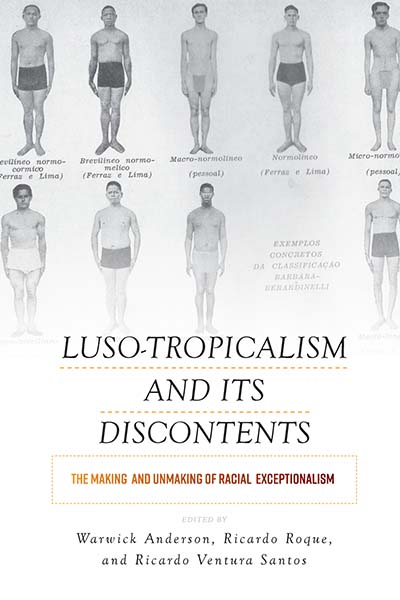Luso-Tropicalism and Its Discontents: The Making and Unmaking of Racial ExceptionalismPosted in Africa, Anthologies, Anthropology, Asian Diaspora, Books, Brazil, Caribbean/Latin America, Europe, History, Media Archive, Social Science on 2019-05-01 22:11Z by Steven |
Luso-Tropicalism and Its Discontents: The Making and Unmaking of Racial Exceptionalism
Berghahn Books
April 2019
346 pages
15 illus., bibliog., index
Hardback ISBN: 978-1-78920-113-0
eBook ISBN: 978-1-78920-114-7
Edited by:
Warwick Anderson, Janet Dora Hine Professor of Politics, Governance and Ethics
Department of History; Charles Perkins Centre
University of Sydney
Ricardo Roque, Research Fellow at the Institute of Social Sciences
University of Lisbon
Ricardo Ventura Santos, Senior Researcher at Fundação Oswaldo Cruz; Professor
Department of Anthropology
National Museum, Rio de Janeiro, Brazil
Modern perceptions of race across much of the Global South are indebted to the Brazilian social scientist Gilberto Freyre, who in works such as The Masters and the Slaves claimed that Portuguese colonialism produced exceptionally benign and tolerant race relations. This volume radically reinterprets Freyre’s Luso-tropicalist arguments and critically engages with the historical complexity of racial concepts and practices in the Portuguese-speaking world. Encompassing Brazil as well as Portuguese-speaking societies in Africa, Asia, and even Portugal itself, it places an interdisciplinary group of scholars in conversation to challenge the conventional understanding of twentieth-century racialization, proffering new insights into such controversial topics as human plasticity, racial amalgamation, and the tropes and proxies of whiteness.
Contents
- List of Illustrations
- Acknowledgments
- Introduction: Luso-tropicalism and Its Discontents / Warwick Anderson, Ricardo Roque and Ricardo Ventura Santos
- PART I: PICTURING AND READING FREYRE
- Chapter 1. Gilberto Freyre’s view of miscegenation and its circulation in the Portuguese Empire (1930s-1960s) / Cláudia Castelo
- Chapter 2. Gilberto Freyre: Racial Populism and Ethnic Nationalism / Jerry Dávila
- Chapter 3. Anthropology and Pan-Africanism at the Margins of the Portuguese Empire: Trajectories of Kamba Simango / Lorenzo Macagno
- PART II: IMAGINING A MIXED-RACE NATION
- Chapter 4. Eugenics, Genetics and Anthropology in Brazil: The Masters and the Slaves, Racial Miscegenation and its Discontents / Robert Wegner and Vanderlei Sebastião de Souza
- Chapter 5. Gilberto Freyre and the UNESCO Research Project on Race Relations in Brazil / Marcos Chor Maio
- Chapter 6. An Immense Mosaic”: Race-Mixing and the Creation of the Genetic Nation in 1960s Brazil / Rosanna Dent and Ricardo Ventura Santos
- PART III: THE COLONIAL SCIENCES OF RACE
- Chapter 7. The Racial Science of Patriotic Primitives: Mendes Correia in ‘Portuguese Timor’ / Ricardo Roque
- Chapter 8. Re-Assessing Portuguese Exceptionalism: Racial Concepts and Colonial Policies toward the Bushmen in Southern Angola, 1880s-1970s / Samuël Coghe
- Chapter 9. “Anthropo-Biology”, Racial Miscegenation and Body Normality: Comparing Bio-Typological Studies in Brazil and Portugal, 1930-1940 / Ana Carolina Vimieiro Gomes
- PART IV: PORTUGUESENESS IN THE TROPICS
- Chapter 10. Luso-Tropicalism Debunked, Again: Race, Racism, and Racialism in Three Portuguese-Speaking Societies / Cristiana Bastos
- Chapter 11. Being (Goan) Modern in Zanzibar: Mobility, Relationality and the Stitching of Race / Pamila Gupta
- Afterword I / Nélia Dias
- Afterword II / Peter Wade

